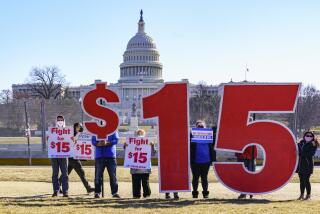As Number of Poor Grows, No Solutions Seem in Sight
- Share via
WASHINGTON — What to do about poverty in America is back on the nation’s agenda again, but neither Congress nor the Administration seems to have any real solution.
More than 25 years after then-President Lyndon B. Johnson declared a national War on Poverty, the situation appears to be worsening.
The proportion of Americans whose earnings are below the official government “poverty line”--the income level designated by Congress as the minimum needed to sustain a family of specific size--has increased since the 1970s and is growing rapidly.
BACKGROUND: Robert Greenstein, director of the Center on Budget and Policy Priorities, a liberal think tank, estimates that 13% to 14% of Americans will be living in poverty by the end of 1991, up from 12.8% in 1989--an increase of about 2 million people.
Today, the United States has the highest poverty rate in the industrialized world for families with children. According to the National Commission on Children, about one U.S. child in five is now living in poverty, up from one out of seven in 1970.
The difficulty is that there is no consensus about how to alleviate poverty. Since Johnson’s War on Poverty in the mid-1960s, the federal government has spent hundreds of billions to ease the plight of the poor but so far has fallen short of its goals.
Now, both policy-makers and voters are trying to create new approaches that bypass the traditional notion of welfare in hopes of dealing more successfully with the problem of poverty while preserving a work incentive.
“More people are shifting (to go along) with expert opinion and finding that welfare addresses the symptoms but not the causes of poverty,” said Isabel Sawhill, director of the Urban Institute, a Washington think tank.
Some experts contend that the government should overhaul the existing welfare system completely.
David T. Ellwood, a Harvard University poverty expert, said that the current system should be replaced with one that guarantees that people who work will not be poor, that both parents help support children when a family breaks up and that work is encouraged.
To help achieve this, he has proposed a plan that would increase the minimum wage and expand so-called “refundable” tax credits--such as the existing Earned Income Tax Credit--that provide cash to the working poor.
Ellwood would also ensure that free or low-cost medical services are made available to all low-income families, not only those that are on welfare. Government aid should be designed “to encourage and support those who want to work to achieve economic independence,” he said.
Others would leave the current system intact but bolster it with new programs. Sen. Daniel Patrick Moynihan (D-N.Y.), for example, has proposed forcing states to send one-fifth of their welfare recipients through training or education programs.
Still others would expand existing efforts, such as the Head Start program for preschool children, that have been judged effective.
Some, including Housing and Urban Development Secretary Jack Kemp, have proposed “empowering” low-income people by helping them buy homes more easily and letting them choose the schools their children will attend.
Kemp would also have the poor run their own housing developments.
Finally, some would institute new economic policies designed to create more unskilled jobs for low-income persons. They would also provide help to train and relocate displaced workers who are seeking new jobs.
OUTLOOK: It is not clear what, if anything, Congress will do to help deal with the poverty problem. Lawmakers are considering a variety of proposals, from health and education to improvements in the Medicaid program.
But experts say that improvements in the situation appear unlikely any time soon, if only because the problem has reached such large proportions.
Analysts say it is likely that any changes will be incremental, at least until policy-makers reach a firmer consensus on what should be done.
More to Read
Sign up for Essential California
The most important California stories and recommendations in your inbox every morning.
You may occasionally receive promotional content from the Los Angeles Times.













